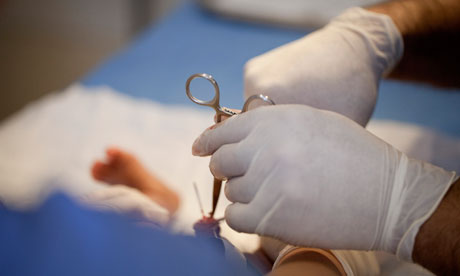
He was born in Chadderton, Greater Manchester, in March 2010. His parents, filled with the joy, hope and optimism of new parenthood, named him Goodluck. When he was only 27 days old, a midwife called Grace Adeyele accepted £100 to hack at his tiny penis with a pair of scissors. The baby screamed so loud his mother had to look away. Adeyele dabbed the ragged wound with olive oil, dressed it with a small bandage and left him to bleed. He died the next day from his wounds. As if the short life and tragic death of Goodluck Caubergs is not shocking enough, consider that his case is not unique. Earlier this year an inquest in London recorded a verdict of accidental death, having heard how Angelo Ofori-Mintah died after being circumcised at home. The rabbi faced no charges.
Such gruesome deaths following circumcision may be rare in the UK, but non-fatal complications are anything but. Manchester Royal Children's hospital reports that it treats around three cases of bleeding circumcisions every month. In 2009 alone, in one hospital in Birmingham, 105 boys were treated at A&E for complications after circumcisions. One per month had life-threatening injuries. In June, a letter to the newsletter of the British Association for Community Child Health reported on some of the injuries caused by unlicensed circumcision practitioners in the Bristol area. They included a fractured skull caused by a baby falling off a kitchen table during a home circumcision.
An audit of circumcisions conducted at an Islamic school in Oxford, and reported in the Journal of Public Health this year, revealed that 45% of boys had suffered complications. All these examples have one common feature: they were conducted in non-clinical conditions. While it is illegal to tattoo a child in the UK, there is no law to prevent anyone from setting up a business in permanently slicing the sensitive, delicate skin from boys' genitals without anaesthetic. In Rusholme, Manchester, there is a notice on a first floor window offering circumcisions, quite literally in a backstreet above a kebab shop. This is utterly obscene.
These examples are all from Britain, where circumcision is comparatively rare. Extrapolate this across the world and we are confronted with a horrific tide of death, mutilation and unnecessary suffering. This summer the ruling of a German court sparked an international debate about the legality, ethics and public health merits of routine and ritual male circumcision. Personally I would like to see an end to unnecessary genital mutilation altogether, but an immediate legal ban is likely to be counterproductive – it could encourage the very backstreet practices that are most likely to kill and maim. Instead, a long process of cultural engagement is required, aimed at education, persuasion and, ideally, ultimately the elimination of all unnecessary circumcision.
But long before then, our lawmakers need to look urgently at regulation and administration. After months of wrangling, last week the Bundestag finally agreed a law that permits unnecessary circumcision only under clinical conditions, by trained professionals and with anaesthetic. This should be the bare minimum required in any civilised society. Of course for some ethnic and religious communities, notably Jewish and Muslim, circumcision is steeped in religious and cultural significance. This must be acknowledged and respected.
So too must the truth that some rituals can be dangerous and anachronistic. In New York recently, it emerged that 11 babies in as many years had contracted herpes during their circumcisions, of whom two died and two more suffered brain damage. The infection was caused by the Orthodox ritual of metzitzah b'peh, in which the mohel puts his mouth directly on the baby's bleeding penis and sucks the wound clean. There is no way of knowing the extent to which the same practice is being employed in the UK, but there is nothing to legally proscribe it.
Grace Adeyele was today convicted of manslaughter by negligence. It should never have got that far. This cruel commercial sideline should have been outlawed long ago. We must bear in mind that had her work not ended so tragically, she would have committed no offence under British law. Today, like every day, others just like her will be cutting away at little boys' genitals with nothing but scissors, warm water and some olive oil or Vaseline. The broader debate about the health, ethical and cultural merits of male circumcision can and must continue, but the need for clinical control and legal regulation, the obligation to protect other babies from the horrific fate of Goodluck and Angelo, is urgent and surely unarguable.

